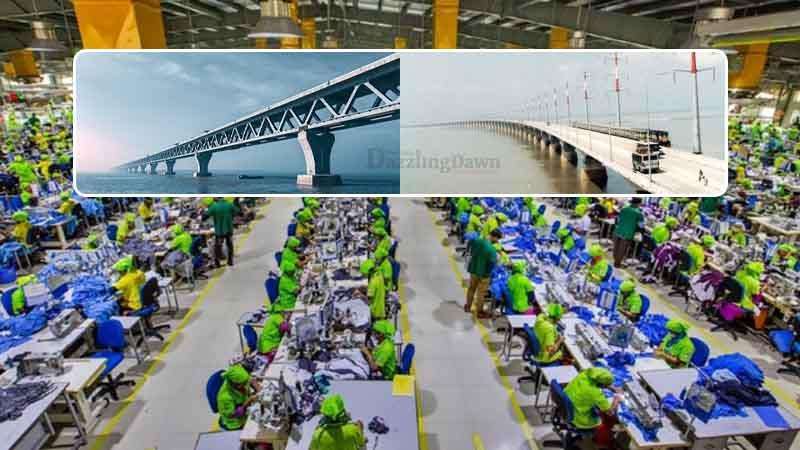Foreign direct investment (FDI) in Bangladesh is likely to suffer heavily in the coming days against the backdrop of recent violence and vandalism that left over 150 killed and several thousand injured across the country, top business leaders, policy-makers and bankers said.
Bangladesh came to a standstill in recent days over the quota issue in the government job as high unemployment among the educated youths has become a matter of concern despite steady economic growth, said a top banker.
High economic disparity, corruption, nepotism, slow employment creation, Russia-Ukraine war, siphoning off state wealth out of the country by some corrupt persons have created a crisis in the economy, said a retired professor of the economics department of the Dhaka University while talking to this correspondent.
Some 20 lakh youths enter the job market every year creating a hiccup in the job market as the Bangladesh economy in the last 10 years also witnessed a growth with creation of fewer jobs in the market, said a leader of the Metropolitan Chamber of Commerce and Industry (MCCI).
Leaders of the Foreign Investors Chambers of Commerce and Industry (FICCI), Bangladesh German Chamber of Commerce (BGCCI), France Bangladesh Chamber of Commerce and Industry, Japan Bangladesh Chamber of Commerce and Industry (JBCCI), Swiss-Bangladesh Chamber of Commerce and Industry, Dutch -Bangla Chamber of Commerce and Industry (DBCCI), Thai- Bangladesh Chamber of Commerce and Industry (BTCCI), American Chamber of Commerce (AmCham), Spain Chamber of Commerce and Industry (SBCC) and Korea -Bangladesh Chamber of Commerce and Industry (KBCCI) have expressed concern over the recent violence that demerged reputation of the country, sources said.
Meanwhile, the reports of violence and student protest over quota in the government jobs in Bangladesh have been widely covered in the mainstream media of the European countries, USA, United Kingdom, Canada, South Korea, Japan, China and Australia creating a crisis of reputation of the country , sources said.
The United Kingdom, the USA, the western countries, South Korea and China are major investors in Bangladesh , according to the Bangladesh Bank, Bangladesh Investment Development Authority, Bangladesh Export Processing Zones Authority (BEPZA).
“The deep engagement of business leaders, Bangladesh diplomats abroad, Bangladeshi diaspora and the government policy support can improve the situation and regain reputation of the country,” said a leader of the Bangladesh Garment Manufacturers and Exporters Association (BGMEA)
Meanwhile, the Bangladesh Bank report said “Net FDI inflows when classified by countries in a bloc/group/economic community revealed that the Other European Countries (OEC) topped in the list of investing countries, net FDI inflows worth USD 862.49 million in the year 2023 under review as compared to USD 845.29 million in the preceding year.
The second highest investing group was the number of countries of Other Asian Countries (OAC) which accounted for an amount of USD 686.00 million in the year 2023 under review as compared to USD 836.02 million in the preceding year.
The third highest investing group was the number of countries of European Union (EU) which accounted for an amount of USD 500.31 million in the year 2023 under review as compared to USD 623.51 million in the preceding year.
The fourth highest investing group was the number of countries of North American Free Trade Agreement (NAFTA) which accounted for an amount of USD 329.54 million in the year 2023 under review as compared to USD 361.33 million in the preceding year, according to the Bangladesh Bank report.
The United Kingdom (UK) held the top position in the list of FDI in 2023 with USD 613.93 million or 20.4 per cent, Netherlands held the second position with USD 366.96 million or 12.2%, United States of America (USA) held the third position with USD 314.9 million or 10.5%, People’s Republic of China held fourth position with USD 259.54 million or 8.6%, South Korea held the fifth position with USD 181.43 million or 6.0%, Norway with USD 176.87 million or 5.9%, accounted 63.6% towards the contribution of total Net FDI Inflows.
“Over the past three decades the key features of economic policy making in many countries particularly in the developing world is attracting foreign direct investment (FDI). FDI performs a multidimensional role in the overall development of the host economies. Most of the studies advocate a positive relationship between foreign direct investment and economic growth. FDI makes a vital contribution to growth and development in Asia and the Pacific, “ said a Bangladesh Bank report.
The BB report also said “Investment or creation of capital is very important for the growth and prosperity of an economy. Investment may lead to the creation of physical capital goods, finance and human capital. In grouping with other factors of production and technology, investment determines the levels and growth through changes in production and consumption of goods and services. Both domestic investment and foreign investment are equally needful whereas domestic investment may lead to the creation of domestic savings, consumption & employment and foreign investment can decrease the saving gap.”
The BB report said “The inflows of FDI have contributed significantly to the economic development of Bangladesh. During the Calendar Year 2023 FDI net inflows of Bangladesh was USD 3.0 billion while it was USD 3.5 billion during the Calendar Year 2022. Bangladesh Bank, Statistics Department has been conducting an enterprise survey since 1995 to collect detailed information on FDI in Bangladesh. Now FDI data is compiled and published on quarterly basis in the Bangladesh Bank website www.bb.org.bd.”
The Bangladesh Bank report said “Bangladesh has become one of the most attractive emerging markets globally. The gross FDI received from CY 2019 to CY 2023 was USD 20050.30 million and net FDI stood at USD 14817.44 million. This flow funds over the years have helped the country in advancement of technology, skill up gradation, employment generation, better infrastructure and management. Gross FDI inflows during the year 2023 received USD 3969.76 million. The size of disinvestment (included capital repatriation, reverse investment, loans to parents, and repayments of intra-company loans to parents) during the year 2023 recorded USD 965.36 million which was 24.3% of gross FDI inflows. Hence, net FDI inflows in Bangladesh during the year 2023 were USD 3004.40 million. Gross FDI inflows during the quarters January-March, April-June, July-September and October-December of the year 2023 were USD 856.59 million, USD1050.89 million, USD913.28 million and USD 1149 million respectively.”
Disinvestment during the quarters January-March, April-June, July-September and October-December of the year 2023 were USD 230.12 million, USD 231.67 million, USD 243.07 million and USD 260.5 million respectively. Net FDI inflows during the quarters January-March, April-June, July-September and October-December of the year 2023 were USD 626.47 million, USD 819.22 million, USD 670.21 million and USD 888.5 million respectively, according to the BB report.
Meanwhile, the recent shutdown has significantly impacted Bangladesh's economy and severely damaged the country's reputation as a credible and resilient economy, business leaders said on Sunday.
Zaved Akhtar, president of the Foreign Investors Chamber of Commerce and Industries (FICCI), estimated the shutdown's economic impact to be around $10 billion and rising.
Mahbubul Alam, president of the Federation of Bangladesh Chambers of Commerce and Industries (FBCCI), quoted the Bangladesh Garment Manufacturers and Exporters Association (BGMEA), stating that its member factories incurred losses of Tk6,400 crore.
While the Bangladesh Knitwear Manufacturers and Exporters Association (BKMEA) has yet to assess its losses, insiders suggested they also have incurred significant losses.
The observations came at a meeting with four cabinet members, led by Salman F Rahman, private industry and investment adviser to the prime minister, at the BIDA office in Dhaka.
Supply lines and operations in the FMCG industry have been significantly impacted, resulting in a setback of over $100 million, said Zaved Akhtar, also the chairman and managing director of Unilever Bangladesh.
"We have spent 10 years trying to improve the adverse effects of the Rana Plaza disaster in 2013 and the terrorist attack in 2016. This current social unrest set the development back of this country by at least 10 years," said the FICCI president in a written statement.
Amid this situation, business leaders urged the government to support by fostering ease of doing business, waiving port demurrage charges, ensuring uninterrupted energy supply, curbing revenue official harassment, and restoring investor and business confidence.
Responding to businesses' queries and demands, Salman F Rahman said that five broad issues have been identified that businesses want resolved. These issues are related to Chittagong port, the National Board of Revenue (NBR), banking, ICT, and energy supply.
"We will hold separate meetings with the relevant ministries, government departments, and stakeholders to discuss the problems raised by businesses," he said.
Regarding port-related problems highlighted by businesses, Salman said they mentioned port congestion, demurrage costs, and increased turnaround times for shipping lines. Regarding banking issues, businesses expressed the need for extended payment delays, loan rescheduling, and lower interest rates.
He also noted that an alternative or standby internet system for businesses in case of a nationwide shutdown for emergencies is a good suggestion.
After the meeting, Anwar-Ul-Alam Chowdhury Parvez, president of Bangladesh Chamber of Industries, told TBS that businesses need bank support to pay employee salaries and extend loan instalment payment periods. He also highlighted the need for government assistance in paying utility bills.
Private industry and Investment Adviser to the Prime Minister Salman F Rahman, said the country's reputation is at stake due to rumours spread abroad. "We have to repair our image now. The damages can be recovered as soon as we can bring back normalcy."
He also asked businesses to provide details of their financial losses, after which further actions will be determined.
The FBCCI president announced that they are compiling this information to present to the government.
Meanwhile, the Bangladesh Garment Manufacturers and Exporters Association (BGMEA) on Monday urged the global buyers, apparel brands and retailers to be more sympathetic to the RMG industry of the country under the current circumstances.
The BGMEA made the call at a meeting with the global buyers and apparel brands held at the BGMEA office in the capital's Uttara area.
After the meeting, BGMEA President SM Mannan Kochi said the retailers and brands assured them that they would not seek any discount, demand air shipment or cancel work orders because of the latest spell of violence and a halt in production.
Meanwhile, the international clothing retailers and brands have expressed concern about the timely shipment of garment items as the local exporters are facing delays in ports because of the latest countrywide violence and curfew centering the quota reform movement.
They also urged the local garment suppliers to ensure the goods are shipped on time and stressed the need for restoring internet services for faster communication with the retailers.
The global buyers also urged the BGMEA leaders to talk with the government officials to restore uninterrupted internet with high speed so that they can communicate with their headquarters.
Japanese entrepreneurs and businessmen are going very slowly with new investment proposals in Bangladesh as the country’s investment policy seems inconsistent with the situation getting complicated after the National Board of Revenue (NBR) withdrew some incentives in the current budget, sources said.
Meanwhile, Japan Ambassador in Dhaka Iwama Kiminori last year said that Bangladesh should improve the macro-economic stability and reform the taxation system in a bid to attract Japanese investment.
Terming the tax system in Bangladesh as cumbersome that needs to be simplified and improved, Iwama Kiminori said letter of credit (L/C) settlements should be resolved quickly as lingering the process increases the cost of business.
Iwama Kiminori the international investors including Japanese ones are looking at the macro-economic stability of Bangladesh that is passing through a challenging period.
Meanwhile, Myung-Ho Lee, immediate past president of the Japan-Chamber of Commerce and Industry (JBCCI), said Japanese entrepreneurs and businessmen are now considering Bangladesh as new destination of investment.
In 2023, Myung-Ho Lee said that continuation of the existing industrial policy is important in the context of attracting Japanese investment in Bangladesh.
He said that the tax policy should be similar in case of Bangladeshi and Japanese businessmen and concerned authorities should ensure that in the greater interest of wooing Japanese investment.
Myung-Ho Lee said that Bangladesh should improve its business environment, remove bureaucratic tangles and impart timely decisions to lure Japanese investment on a large scale.
According to the data of Bangladesh Bank (BB), Bangladesh attracted foreign direct investment (FDI) worth 3 billion US dollars in 2023 calendar year. Bangladesh attracted 3439.63 million US dollars in 2021-22 Fiscal year with Japanese FDI recording at only 122.72 million. Japan held the ninth position in terms of attracting FDI in Bangladesh (3.6 per cent of total FDI).
_8.jpg)
_5.jpg)
_8.jpg)





.svg)


